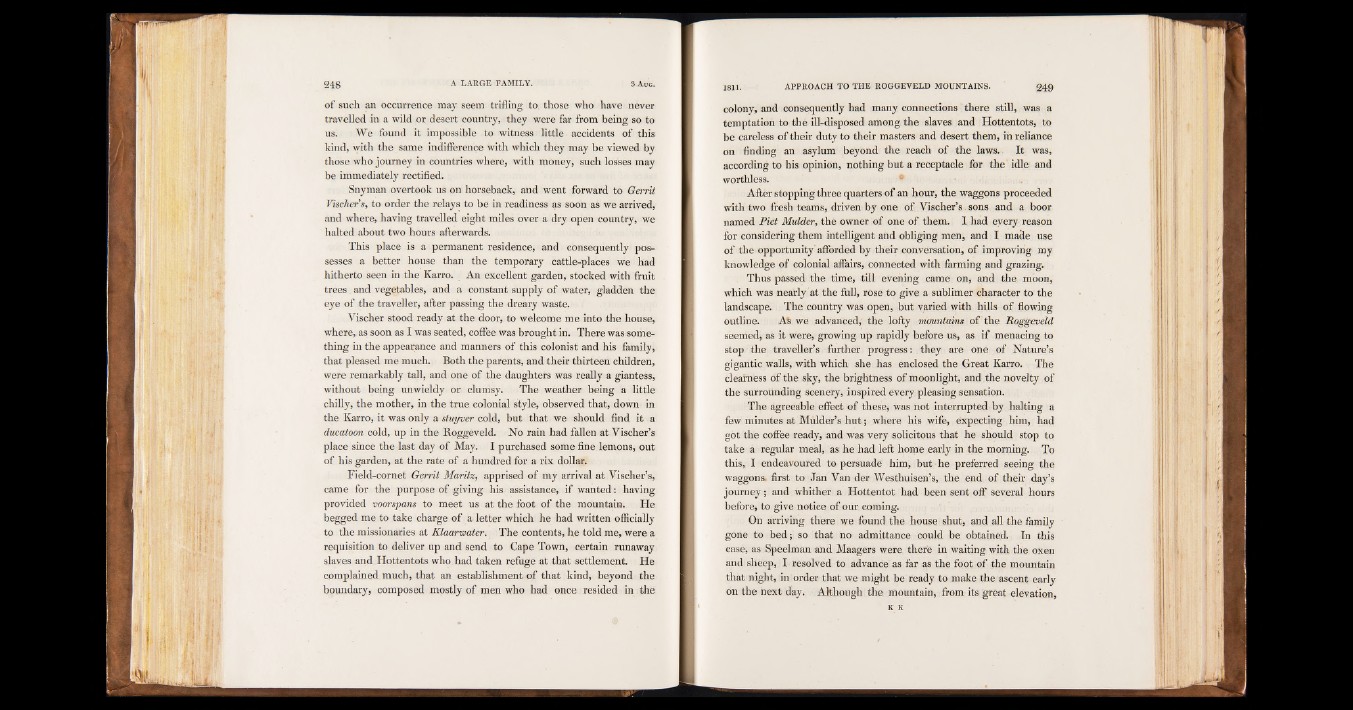
of such an occurrence may seem trifling to. those who have never
travelled in a wild or desert country, they were far from being so to
us. We found it impossible to witness little accidents of this
kind, with the same indifference with which they may be viewed by
those who journey in countries where, with money, such losses may
be immediately rectified.
Snyman overtook us on horseback, and went forward to Gerrit
Vischer s, to order the relays to be in readiness as soon as we arrived,
and where, having travelled eight miles over a dry open country, we
halted about two hours afterwards.
This place is a permanent residence, and consequently possesses
a better house than the temporary cattle-places we had
hitherto seen in the Karro. An excellent garden, stocked with fruit
trees and vegetables, and a constant supply of water, gladden the
eye of the traveller, after passing the dreary waste.
Vischer stood ready at the door, to welcome me into the house,
where, as soon as I was seated, coffee was brought in. There was something
in the appearance and manners of this colonist and his family,
that pleased me much. Both the parents, and their thirteen children,
were remarkably tall, and one of the daughters was really a giantess,
without being unwieldy or clumsy. The weather being a little
chilly, the mother, in the true colonial style, observed that, down in
the Karro, it was only a stuyver cold, but that we should find it a
ducatoon cold, up in the Roggeveld. No rain had fallen at Vischer’s
place since the last day of May. I purchased some fine lemons, out
of his garden, at the rate of a hundred for a rix dollar.
Field-cornet Gerrit Maritz, apprised of my arrival at Vischer’s,
came for the purpose of giving his assistance, if wanted: having
provided voorspans to meet us at the foot of the mountain. He
begged me to take charge of a letter which he had written officially
to the missionaries at Klaarwater. The contents, he told me, were a
requisition to deliver up and send to Cape Town, certain runaway
slaves and Hottentots who had taken refuge at that settlement. He
complained much, that an establishment of that kind, beyond the
boundary, composed mostly of men who had once resided in the
colony, and consequently had many connections there still, was a
temptation to the ill-disposed among the slaves and Hottentots, to
be careless of their duty to their masters and desert them, in reliance
on finding an asylum beyond the reach of the laws. It was,
according to his opinion, nothing but a receptacle for the idle and
worthless.
After stopping three quarters of an hour, the waggons proceeded
with two fresh teams, driven by one of Vischer’s . sons and a boor
named Piet Mulder, the owner of one of them. 1 had every reason
for considering them intelligent and obliging men, and I made use
of the opportunity afforded by their conversation, of improving my
knowledge of colonial affairs, connected with farming and grazing.
Thus passed the time, till evening came on, and the moon,
which was nearly at the full, rose to give a sublimer character to the
landscape. The country was open, but varied with hills of flowing
outline. AS we advanced, the lofty mountains of the Roggeveld
seemed, as it were, growing up rapidly before us, as if menacing to
stop the traveller’s further progress: they are one of Nature’s
gigantic walls, with which she has enclosed the Great Karro. The
clearness of the sky, the brightness of moonlight, and the novelty of
the surrounding scenery, inspired every pleasing sensation.
The agreeable effect of these, was not interrupted by halting a
few minutes at Mulder’s h u t; where his wife, expecting him, had
got the coffee ready, and was very solicitous that he should stop to
take a regular meal, as he had left home early in the morning. To
this, I endeavoured to persuade him, but he preferred seeing the
waggons, first to Jan Van der Westhuisen’s, the end of their day’s
journey; and whither a Hottentot had been sent off several hours
before, to give notice of our coming.
On arriving there we found the house shut, and all the family
gone to bed; so that no admittance could be obtained. In this
case, as Speelman and Maagers were there in waiting with the oxen
and sheep, I resolved to advance as far as the foot of the mountain
that night, in order that we might be ready to make the ascent early
on the next day. Although the mountain, from its great elevation,
K K